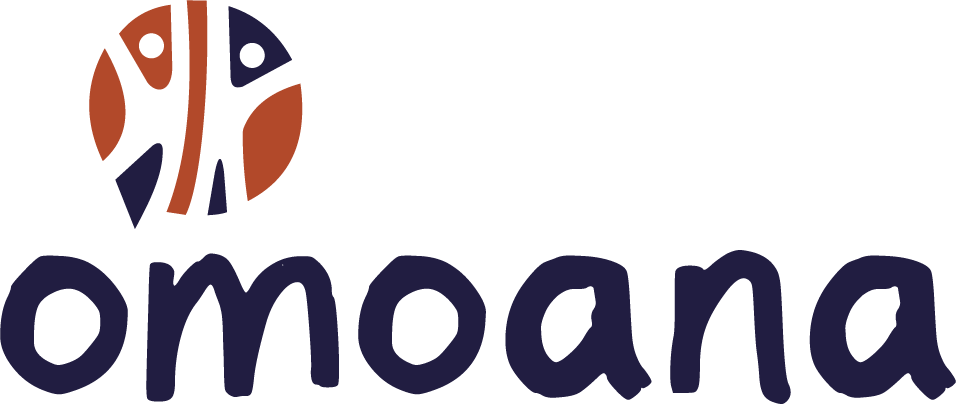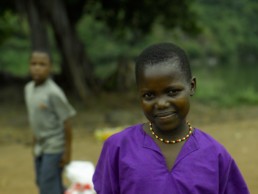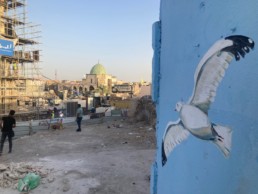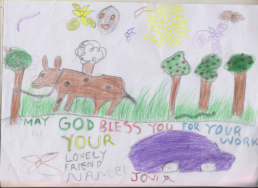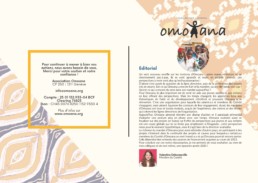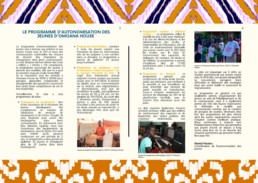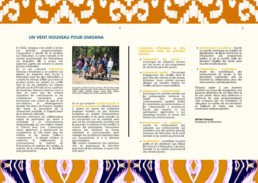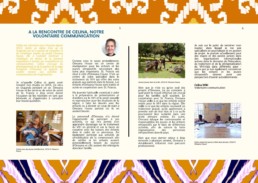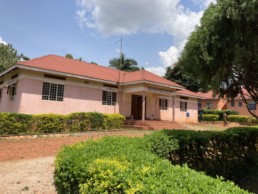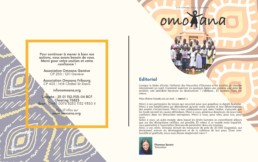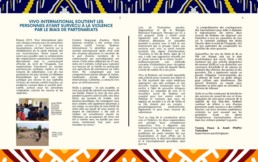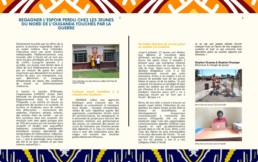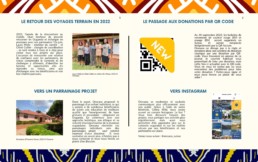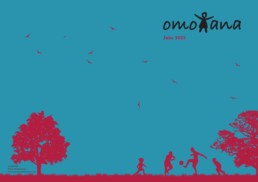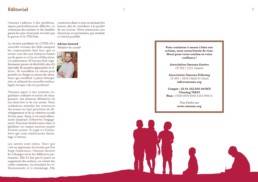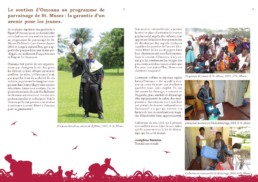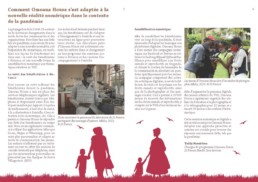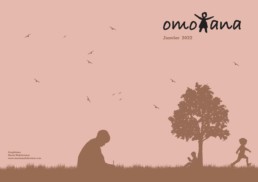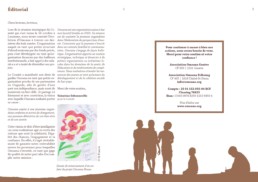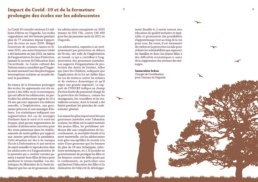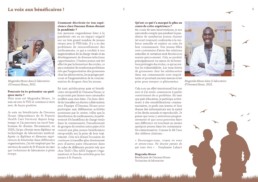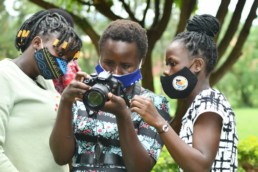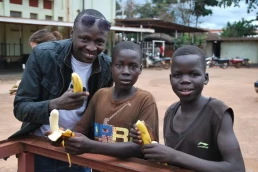Breaking news : Omoana extends its activities to Iraq
Building a new narrative for peace with the youth of Mosul
Omoana strengthens the resources of young people as actors in the development and social cohesion of their country. Originally active in Uganda, with a wealth of experience working with young people formerly affiliated to the Lord’s Resistance Army (LRA), the organisation has developed expertise in psychosocial support through art and in mental health. As a result, it has decided to extend its activities to Iraq, a country where young people face similar dynamics of violence, with many children and young people associated with armed groups, having serious consequences for their well-being.
Developing social skills and preventing violence among young people
A long history of violence
With almost a quarter of the Iraqi population aged between 15 and 24, young people are the backbone of the country’s social, economic and political transformation. However, they are disproportionately affected by conflict. After the Islamic State (EI) occupied much of its territory, much remains to be rebuilt. Iraqi children and young people have been greatly affected by the crisis. They have suffered and sometimes committed high levels of violence. Despite the environment in which they lived and the groups they joined, they must be given the opportunity to build a new narrative for peace.
Years of conflict between Iraqi security forces and the EI have devastated the north of the country. According to the United Nations Office for the Coordination of Humanitarian Affairs (UNOCHA), nearly 664,000 children are at risk of protection. Of these children, 122,000 are living in critical shelters with limited access to essential services. The lack of livelihood opportunities for their families and the COVID-19 epidemic have had a negative impact on their income-generating potential. As a result, children continue to be exposed to the risks of child labour and early marriage. Around 456,000 children still lack basic civil status documents and almost 300,000 school-age children do not regularly attend formal or informal education, putting them at increased risk of recruitment by armed groups in the areas where they operate. More than 1,000 children remain deprived of their liberty for national security reasons. Children from families previously associated with armed groups, or perceived to be so, are discriminated against and face difficulties integrating into their communities.
The protection issues mentioned above are factors that encourage young people to return to armed groups. Be that as it may, the social integration of young people at risk of recruitment by violent extremist groups remains a key and complex issue that needs to be addressed.
Art for peace and protection for the children of Mosul
Omoana’s first partner in the country will be Aid Gate Organization (AGO). Aid Gate Organization (AGO) is an independent, non-partisan national organisation with a history dating back to 2014 with the start of the occupation of much of Iraq by The Islamic State (EI). AGO works tirelessly to help internally displaced people, refugees, asylum seekers, returnees and vulnerable host communities in Iraq. The aim of the new project, implemented with technical and financial support from Omoana, will be to build the capacity, resilience and talents of children and young people affected by conflict through arts-based initiatives and protection services. It will target children and young people in detention, as well as those in at-risk communities. The approach aims to work at different levels to support the reintegration of children formerly affiliated to armed groups and to promote the well-being of young people in communities. At an individual level, children in conflict with the law will be monitored to ensure they have access to legal services and professional education and training. Low-intensity psychological support will also be available. Their families will also be supported and advised on the best ways to care for a child or young person after detention. Children and young people in detention and in the communities will receive peace education sessions to strengthen their social skills and critical thinking and prevent violence. They will also benefit from artistic activities to develop their talents and personal confidence. Young people in the communities will also be encouraged to organise their own community events on peace-building themes. Tools such as forum theatre and the creation of murals will be used. Social workers from AGO and the public services will also receive training in peace education for young people and in low-intensity psychological services.
Preserving the dignity of children affiliated to armed groups is no easy task. It requires commitment, networking and technical skills. We are striving to work with national and international experts to respond to these challenges as effectively as possible and to try to give them sympathetic attention, despite the violence of which they are above all victims.
Presentation of the Omoana House project in Esprit Solidaire
Following a visit to Uganda, Chloé Collier, our coordinator, was invited by Léman Bleu to record a programme on Esprit Solidaire, presenting our Omoana House project.
Watch the programme in full here.
Uganda faces the Covid-19 pandemic
Between April and July this year, Uganda experienced a rising rate of Covid-19 infections. This put a strain on the country’s health system, as evidenced by the number of deaths and hospitalisations linked to Covid-19. At the beginning of June, a national lockdown was declared for a period of six weeks. This measure enabled the country to control the rate of infection among the population and to provide healthcare for the most seriously ill.
Today, the country is opening up again. The infection rate has fallen from 21% to 8%, the number of deaths is down and the population is more respectful of preventive measures. The lifting of confinement at the end of July has enabled the transport sector and certain commercial sectors to start operating again. However, other sectors remain closed, including educational establishments, social and religious community gatherings and the entertainment and leisure sector.
Vaccination of the population is underway, with priority given to essential workers and people suffering from chronic illnesses. The government’s objective is to vaccinate 50% of the Ugandan population to enable the country to control the infection rate. However, to date only 1.2% of the population has been vaccinated. Funds to help victims of the pandemic have been paid out to the most vulnerable people. 500,000 of them have received UGX 100,000 (USD 29) for one month. The government is also supporting research into national treatments for Covid-19. Clinical trials of Ugandan plant-based treatments (COVIDEX and COVICYLE) appear to be showing good results.
Impact of the pandemic on projects
The prolonged and repeated closure of schools has exposed children to problems such as child labour, teenage marriage, dropping out of school and violence, which seem to affect girls more than boys.
In this context, Omoana has encouraged its beneficiaries to adapt to virtual learning platforms provided by schools or the government, such as radio-based study programmes for primary school pupils and distance learning models for secondary and tertiary school pupils.
Our education project partners, St Moses and Handle Uganda, provided additional monitoring of students and tutors to avoid failures that could affect the continuation of schooling when the schools reopen.
The activities of Omoana House also had to be adjusted. Additional security measures were put in place to restrict access by outsiders to the rehabilitation centre in order to protect children at high risk of vulnerability to the virus (particularly HIV-positive children). Additional nutritional supplements were offered to the children to boost their immunity.
During this period, the health of the children reintegrated into their communities was closely monitored and antiretroviral treatment was provided to them at home by the Village Health Teams (VHTs). Peer educators also adapted by approaching beneficiaries directly on social networks (Facebook and Twitter), conducting targeted awareness campaigns and offering individual support.
The mental health project’s operations were mainly affected by restrictions on the number of passengers per vehicle and inter-regional transport. Activities such as community awareness-raising were interrupted due to the ban on gatherings.
Many beneficiaries also face mental health problems due to depression, stress and the stigma attached to people affected by Covid-19. There is a great deal of uncertainty about the country’s health and economic future.
Immaculate Achan
Country coordinator
Uganda's youth in search of new horizons
Michael's voice on the phone is calm and determined. "We've been swamped with work since the confinement ended," he says from Gulu, the main town in northern Uganda.
Michael Ojok, 32, heads up Hashtag Gulu, a non-governmental organisation that offers support and reintegration programmes for children forced to live on the streets and do whatever jobs they can find to manage to eat every day.
He describes how many young people in Gulu, and in most of Uganda, have had to face up to the difficulties of a very closed labour market and a changing economy hit hard by the health crisis. Lacking opportunities, many are forced to make extreme choices.
For Michael, the education system does not prepare young Ugandans sufficiently: “The level of education is high, but the system produces more graduates than the market can absorb. A young person who concentrates solely on his or her studies will have less chance of finding a job on leaving school. You get your paper but you have to find ways of surviving. They should be taught practical skills. That way, manual jobs would not be a last resort. Young people need more support.”
So, to avoid the worst, many try to set up their own business. They put in an enormous amount of energy and develop new ideas. Unfortunately, loans that are virtually inaccessible and skills that weren’t on the school curriculum (customer management, networking, etc.) soon get the better of their ambitions. The road is bumpy.
Even more so when, in the lives of these young people, a civil war that lasted nearly 20 years has left deep psychological scars: aggression in everyday relationships, frequent nightmares, tremor attacks… and the stigmatisation of those who, within a community or among family members, suffer from these symptoms. “It’s a subject that nobody talks about openly. There’s no attempt to remember,” laments Anett Pfeiffer Tumusiime, director of the Vivo Uganda NGO supported by Omoana.
"Even within a couple, the tendency is to hide the horrors that may have happened during this period. But everyone was affected. In terms of mental health, what happened 20 years ago is as vivid as if it had happened yesterday."
— Anett Pfeiffer Tumusiime, director of the NGO Vivo Uganda supported by Omoana
Vivo Uganda contributes to Hashtag Gulu’s efforts by offering narrative therapy sessions to the beneficiaries of Michael Ojok’s NGO. This partnership has also enabled some members of the Hashtag Gulu team to receive training specifically focused on trauma treatment. In this way, the two organisations are able to provide psychological help to the most traumatised people. In some places, support groups have been spontaneously set up to provide financial assistance to former child soldiers. Radio programmes also help to break the silence and reduce stigmatisation. “Change is happening gradually, but it’s a long and complex process,” explains Immaculate Achan, country coordinator for Omoana.
“This process is essential,” points out Anett, “because today’s parents were children during the civil war. It is those who suffered most from the acts committed during this conflict who are now raising the next generation.“
At the other end of the phone, Michael, the father of a little girl, would like to see more. He recognises the importance of such a conversation “to make sure that such violence never happens again“, but pleads for a subtle balance: “How can we acknowledge the atrocities committed while not focusing on them? I think it’s time for us to move from the role of victims to that of survivors. We have to ask ourselves: how can I make plans and succeed in what I undertake without constantly returning to this conflict? That’s the challenge: to move away from the story of this war and focus on the challenges that lie ahead. We can’t keep blaming the current situation on the civil war, something has to change. What opportunities are there and how can the younger generation access them?“
